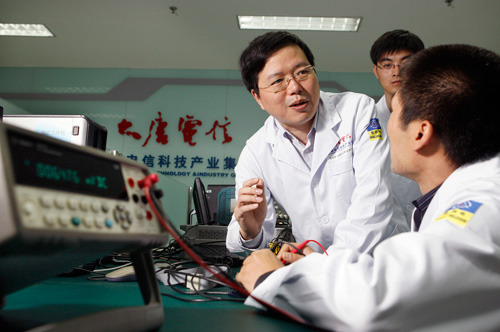|
 |
|
KNOWLEDGE ACKNOWLEDGED: Wu Jiang, chief IT security scientist at Beijing-based Datang Telecom Technology & Industry Group, speaks to his lab colleagues (WAN XIANG) |
Several migrant workers and rural doctors, and an Olympic gold medalist, are representing 82 million members of the Communist Party of China (CPC) at the Party's 18th National Congress set to open on November 8. The 2,270 delegates were elected by 40 electoral units between October 2011 and July 2012. Compared with previous congresses, more young faces and professionals will serve as delegates.
The national congress will craft Party principles and policies, as well as elect the Party's new leadership. As part of the country's efforts to build a wealthier society, deepen reforms of the country's economy and transform its model of economic development, the 18th congress is expected to release important policies to guide the country's development in the next five years.
Party members who joined the CPC after the reform and opening up in the late 1970s constitute the majority of the delegates, said Wang Jingqing, Vice Minister of the Organization Department of the CPC Central Committee, at a press conference in Beijing on August 14.
A total of 1,640 delegates joined the Party after November 1976, accounting for 72.2 percent of the total, 20.5 percentage points higher than that of the congress in 2007, he said.
The average age of the delegates is 52, and 64.8 percent of them are under age 55. There are 114 delegates under 35, accounting for 5 percent of the total, 1.9 percentage points higher than the previous congress. Moreover, 2,122 delegates, or 93.5 percent of the total, have a junior college diploma or above.
The youngest delegate is Jiao Liuyang, an Olympic champion swimmer. She was born in March 1990 and joined the Party in 2008. The oldest is former mayor of Beijing Jiao Ruoyu, who was born in December 1915 and joined the CPC in 1936.
According to the criteria set by the CPC Central Committee, delegates to the Party's national congress must have an exemplary track record in their line of work, Wang said.
Scholars pay close attention to the delegates' capacity to fulfill their duties. Chen Xuewei, a professor at the Party School of the CPC Central Committee, told the China Newsweek magazine that every delegate should be aware of the role he plays.
"The delegates for the upcoming Party congress should shoulder more responsibilities in promoting reforms," Ma Yong, a senior research fellow of Chinese history at the Chinese Academy of Social Sciences, told China Newsweek. He suggested that these delegates spearhead a new round of reforms within the Party by, for instance, declaring their personal assets.
Better represented groups
Among all the delegates to the 18th CPC National Congress, there are 169 workers, a sharp increase from 51 in the previous congress. They include 26 migrant workers who moved from the countryside to work in cities.
About 30.5 percent of the delegates are from the grassroots level, up 2.1 percentage points from the previous congress in 2007, Wang said.
Talking about the election of more grassroots delegates, Bai Zhili, a professor at the School of Government of Peking University, said that on the one hand, the CPC wants to strengthen the role of grassroots organizations in Party affairs; on the other hand, conflicts and problems at the grassroots level have been rising in recent years and grassroots delegates are expected to convey public concerns directly to the Party leadership.
Chen said that more grassroots CPC members attending the Party's national congress could enhance the communication between the CPC Central Committee and grassroots Party organizations and promote intra-Party democracy.
| 